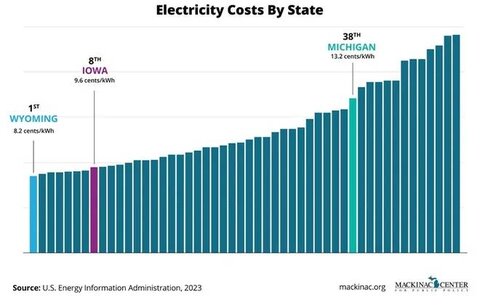This article originally appeared in The Detroit News July 29, 2025.
Gov. Gretchen Whitmer just appointed Shaquila Myers to the Michigan Public Service Commission, the agency that oversees electric and gas rates. Myers has an opportunity in her new role to examine what neighboring states are doing well. In particular, she and her fellow commissioners should review Ohio’s recent energy reforms.
The MPSC is one of the most important regulatory bodies in Michigan, but hardly a household name. This is ironic because the commission helps keep the lights on in your home, and its decisions affect your family budget. If your electric bill goes up, thank the MPSC — they approve the rate increases proposed by Consumers Energy and DTE.
The MPSC’s mission is to ensure “safe, reliable, and accessible energy and telecommunications services at reasonable rates.” But Michigan is failing on the reliability and affordability metrics. Compared to our neighboring states, Michigan residents pay more for electricity and suffer more outages.
According to the U.S. Department of Energy, Michigan ranks third among all states with the most major power outages since 2000. And Michigan’s electricity costs are high; 37 states beat us on affordability.
High energy costs affect the families and companies that are already in Michigan, and they are a major factor for out-of-state companies considering a move. According to the State of the Site Selection 2024 survey, electricity capacity was the top factor affecting industrial projects. And a Consultants Survey ranked energy availability as the top site selection factor on a list of 30 factors.
Michigan learned a shocking lesson in how these decisions are made in 2021, when Ford Motor Co. decided to locate new electric-vehicle and battery plants in Tennessee and Kentucky rather than in Michigan. Electricity costs were a significant factor, Ford CEO Jim Farley told The Detroit News.
Which is why Myers and her fellow regulators at the MPSC should be watching Ohio. In May, Gov. Mike DeWine signed legislation (House Bill 15) to reform Ohio’s energy sector.
The bill attracted strong bipartisan support. Rep. Tristan Radar, a Democrat co-sponsor, praised the reforms in a statement.
“The legislation overhauls utility regulation, bans utilities from owning power plants, strengthens consumer protections, and requires transparent grid capacity maps to improve local solar development,” Radar said. “It also mandates real refunds if utilities overcharge customers and ends backroom utility settlements that bypass public oversight.”
Rea Hederman is vice president of policy at The Buckeye Institute, a free-market think tank in Ohio. He agrees with Radar that the bill is good for both individual consumers and the business community.
“We are boosting energy generation to meet growing demand for data centers and growing businesses,” Hederman told me.
Hederman said the bill reduces taxes on inventory so energy companies have a higher rate of return. It strengthens consumer transparency, including how rate increases are considered. And it cuts regulations that have hampered growth and new investment.
So what about Michigan?
“Michigan policymakers should take inspiration from HB 15 and protect baseload generation, accelerate energy infrastructure permit processes and decrease the power of the monopoly utilities,” says Joshua Antonini, an energy policy analyst at the Mackinac Center.
“Unfortunately,” says Antonini, “they’re doing the opposite by mandating unreliable generation, attacking energy infrastructure like Line 5 and repeatedly approving the utilities’ rate increases.”
My colleague is right. If Michigan hopes to attract talent, jobs and investment, the state needs reliable and affordable energy.
Myers and the Michigan Public Service Commission can help power Michigan’s economy by examining Ohio’s playbook.
Or get ready to watch more companies follow Ford down I-75 south.














